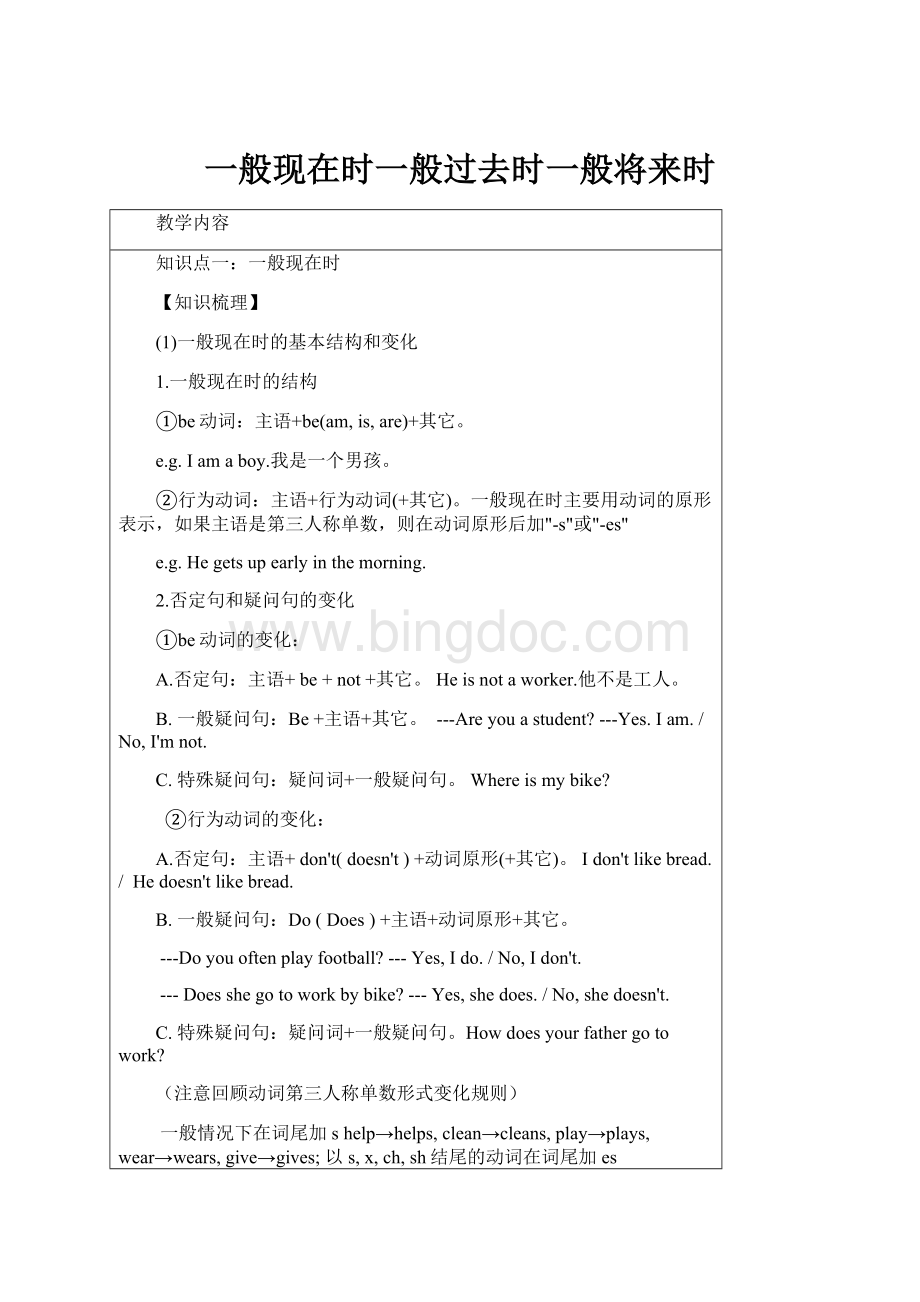一般现在时一般过去时一般将来时.docx
《一般现在时一般过去时一般将来时.docx》由会员分享,可在线阅读,更多相关《一般现在时一般过去时一般将来时.docx(14页珍藏版)》请在冰点文库上搜索。

一般现在时一般过去时一般将来时
教学内容
知识点一:
一般现在时
【知识梳理】
(1)一般现在时的基本结构和变化
1.一般现在时的结构
①be动词:
主语+be(am,is,are)+其它。
e.g.Iamaboy.我是一个男孩。
②行为动词:
主语+行为动词(+其它)。
一般现在时主要用动词的原形表示,如果主语是第三人称单数,则在动词原形后加"-s"或"-es"
e.g.Hegetsupearlyinthemorning.
2.否定句和疑问句的变化
①be动词的变化:
A.否定句:
主语+be+not+其它。
Heisnotaworker.他不是工人。
B.一般疑问句:
Be+主语+其它。
---Areyouastudent?
---Yes.Iam./No,I'mnot.
C.特殊疑问句:
疑问词+一般疑问句。
Whereismybike?
②行为动词的变化:
A.否定句:
主语+don't(doesn't)+动词原形(+其它)。
Idon'tlikebread./Hedoesn'tlikebread.
B.一般疑问句:
Do(Does)+主语+动词原形+其它。
---Doyouoftenplayfootball?
---Yes,Ido./No,Idon't.
---Doesshegotoworkbybike?
---Yes,shedoes./No,shedoesn't.
C.特殊疑问句:
疑问词+一般疑问句。
Howdoesyourfathergotowork?
(注意回顾动词第三人称单数形式变化规则)
一般情况下在词尾加shelp→helps,clean→cleans,play→plays,wear→wears,give→gives;以s,x,ch,sh结尾的动词在词尾加esdress→dresses,fix→fixes,watch→watches,finish→finishes;以“辅音字母加y”结尾的动词,把y变为i,再study→studies,carry→carries,fly→flies)
(2)一般现在时的用法
?
1.表示经常性或习惯性的动作或行为。
常与always,sometimes,often,usually,never等副词连用。
e.g.IgotoschooleverydayexceptSaturdaysandSundays.Mymotheroftengetsupat6o’clock.
2.表示现在的状态,能力,性格,个性。
e.g.Myfatherteachesmaths.
LinYandanceswell.
3.表示普遍真理或客观事实。
e.g.Theearthmovesaroundthesun.Thesunrisesintheeast.
【注意】此用法如果出现在宾语从句中,即使主句是过去时,从句谓语也要用一般现在时。
如:
Ourphysicsteachersaidthatlighttravelsmuchfasterthansound.我们的物理老师说光的传播速度比声音的传播速度快得多,在时间、条件、比较等状语从句中,用现在时表示将来的动作,从句的谓语动词用一般现在时。
如:
Iwille-mailyouassoonasIgettoBeijing.我一到北京就给你发邮件。
Ifyoucomethisafternoon,wewillhaveameeting.如果你今天下午能来,我们就开会。
【例题精讲】
例1.——Whoisthatlady?
——She’sMissGreen.She____usmusic,andsheissogood.
A.taughtB.teachesC.willteachD.isteaching
例2.——IthinkI’lltakeabustothemeeting.
——Thebus?
Ifyou____,youwillbelate.
A.doB.havedoneC.willdo
例3.Unlesstheweather____,wewillhavetocancelthepicnic.
A.improveB.improvesC.improvedD.willimprove
例4.Wedon’tknowifourfriend____.Ifhe____,we’llletyouknow.
A.comes;comesB.comes;willcomeC.willcome;comes
例5.Ourgeographyteachertoldusthattheearth____thesun.
A.wentaroundB.goesaroundC.isgoingaroundD.wasgoingaround
【课堂练习】
1.Look!
Adog____ablindmanacrosstheroad.
A.leadsB.leadC.isleadingD.led
2.Theyusually____TVintheevening.
A.watchB.willwatchC.arewatchingD.watches
3.Hehardly____upearly.
A.getsB.getC.doesn’tgetD.don’tget
4.John____football.
A.likesplayingB.likesplayC.likeplay
5.Frankusually____intouchwithhisprimaryschoolteachersbyemail.
A.keepB.keepsC.keptD.willkeep
知识点二:
一般过去时
【知识梳理】
(1)一般过去时的基本结构和变化
1.定义:
表示过去某时发生的动作或存在的状态。
2.结构:
“主语+动词的过去式”
3.句型转化:
①be动词的过去时的句型如下:
A.否定句:
主语+be动词的过去式(was,were)+not…
B.疑问句:
be动词的过去式(was,were)+主语…?
a.Hewasbusyyesterday.(肯定句)他昨天很忙。
b.Hewasnotbusyyesterday.(否定句)他昨天不忙。
c.Washebusyyesterday?
(疑问句)他昨天忙吗?
d.Thereweren’tanyboysintheroom.房间里没有男孩儿。
e.g.Thereweren’tanyboysintheroom.房间里没有男孩儿。
Werethereanyboysintheroom?
房间里有男孩儿吗?
②行为动词的否定式和疑问式:
A.否定式:
行为动词前加上didnot或缩略式didn’t,并把这个行为动词改为动词原形。
a.IcalledLinTaoyesterdayafternoon.
→Ididnot/didn’tcallLinTaoyesterdayafternoon.
b.IborrowedabookfromSunYanglastSunday.
B.一般疑问式:
若在陈述句中只有行为动词的过去式,那就得在句首加上一个助动词did来帮助提问,然后把句中的行为动词由过去式改为动词原形,并在句末打上问号。
回答时别忘了还用did。
a.Westayedtherefor10dayslastmonth.
→Didyoustaytherefor10dayslastmonth?
Yes,wedid./No,wedidn’t.
b.Maryhadadeliciousdinneryesterdayevening.
→DidMaryhaveadeliciousdinneryesterdayevening?
Yes,shedid./No,wedidn’t.
?
(2)规则动词的变化
过去式(规则变化)
一般情况下,直接在动词词尾加-ed。
watch→watched
plant→planted
以不发音字母e结尾的动词在词尾加-d。
like→liked
move→moved
以“辅音字母+y”结尾的动词,先变y为i,再在词尾加-ed。
study→studied
carry→carried
重读闭音节动词且词尾只有一个辅音字母,先双写词尾的辅音字母,再在词尾加-ed。
stop→stopped
shop→shopped
过去式(be动词)
(不规则变化)
am/is→wasare→were
do→did
(3)不规则动词的过去式和过去分词
第一组AAA
1.cost—cost—cost2.cut—cut—cut3.hit—hit—hit4.let—let—let
5.put—put—put6.set—set—set7.read—read—read
第二组ABC
1.break—broke—broken2.choose—chose—chosen3.speak—spoke—spoken
4.steal—stole—stolen5.wake—woke—woken6.forget—forgot—forgotten
7.take—took—taken8.give—gave—given9.hide—hid—hidden
10.drive—drove—driven11.write—wrote—written12.rise—rose—risen
13.ride—rode—ridden14.eat—ate—eaten
第三组ABC
1.know—knew—known2.grow—grew—grown3.throw—threw—thrown
4.fly—flew—flown5.show—showed—shown
第四组ABB
1.build—built—built2.burn—burnt—burnt3.mean—meant—meant
4.lend—lent—lent5.send—sent—sent6.spend—spent—spent
第五组ABB
1.keep—kept—kept2.sweep—swept—swept3.sleep—slept—slept
4.leave—left—left5.feel—felt—felt6.smell—smelt—smelt
7.lose—lost—lost8.learn—learnt—learnt(learned—learned)
9.get—got—got10.do—did—done11.go—went—gone
第六组ABB
1.make—made—made2.hear—heard—heard3.have—had—had
4.bring—brought—brought5.find—found—found6.buy—bought—bought
7.think—thought—thought8.teach—taught—taught
第七组ABB
1.dig—dug—dug2.lead—led—led3.hold—held—held
4.meet—met—met5.say—said—said6.pay—paid—paid
7.win—won—won8.sell—sold—sold9.tell—told—told
10.stand—stood—stood11.understand—understood—understood
12.sit—sat—sat13.wear—wore—worn
第八组ABC
1.begin—began—begun2.swim—swam—swum3.sing—sang—sung
4.ring—rang—rung5.drink—drank—drunk6.come—came—come
7.become—became—become8.see—saw—seen9.run—ran—run
11.lie—lay—lain—lying(躺)12.lie—lied—lied—lying(说慌)13.lay—laid—laid(放)
(4)一般过去时的用法
①表示过去某一时刻或某一段时间内所发生的动作或情况,常与明确的时间状语连用,如:
yesterday,lastweek(month,year...),ago,justnow,attheageof…,in1980等连用。
如:
Attheageoften,shebegantolearntoplaythepiano.
十岁的时候,她开始学弹钢琴。
②表示过去经常发生或反复发生的动作,常与表示频度的时间状语连用。
如:
WhenIwasachild,Ioftenplayedfootballinthestreet.
当我是个孩子的时候,我经常在街上踢足球。
【例题精讲】
例1.——Wheredidyougolastweekend?
——I____totheGreatWall.
A.goB.wentC.willgoD.havegone
例2.LastweekVivian____adressforhermotherwithherfirst-monthsalary.
A.buyB.boughtC.willbuyD.wouldbuy
例3.Ohno!
I____mybookinthelab.
A.leaveB.leftC.willleaveD.wasleaving
例4.——Yourcoatfitsyouwell.
——Thankyou.I____itwhenIwasonvacation.
A.haveboughtB.buyC.bought
例5.Myhusbandalways_____meflowerseveryweekbeforewegotmarried,butnowhenever____.
A.sent;doesB.sends;doesC.wasgoingtosend;doD.sent;do
【课堂练习】
1.——DidBillyandAnnafindawayoutatlast?
——Yes,they____aplananddidit.
A.wereworkingoutB.workedoutC.areworkingoutD.haveworkedout
2.Yesterdaytheteachertoldustheearth____thesun.
A.goesaroundB.wentaroundC.isgoingaroundD.wouldgoaround
3.——Lucyhas____toLondon.HowcanIgetintouchwithher?
——Don’tworry.Shewillphoneyouassoonasshe____there.
A.been;willgetB.been;getsC.gone;willgetD.gone;gets
4.——Oh,no!
Ican’tfindmymobilephone!
——Well,where____youlastputit.
A.haveB.doC.did
5.——HaveyoueverclimbedMountTai,Carol?
——Yes,I____inTaianforaweeklastyearandreachedthetopofittwice.
A.hadstayedB.stayC.stayedD.havestayed
知识点三一般将来时
【知识梳理】
(1)一般将来时的结构
①will+动词原形,常与表示将来的时间状语连用。
如:
e.g.Iwillmeetyouattheschoolgatetomorrow.明天早上我将在校门口见你。
②begoingto+动词原形表示将来发生的动作或存在的状态,主语一般是人。
如:
e.g.Iamgoingtobe15nextweek.下周我就15岁了。
③will和begoingto的区别
begoingto与will两者都可表示将要发生的事、将要去做某事,但它们有如下几点区别:
A.begoingto表示近期、眼下就要发生的事情,will表示的将来时间则较远一些,如:
e.g.Heisgoingtowritealettertonight.
Hewillwriteabookoneday.
B.begoingto表示根据主观判断将来肯定发生的事情,will表示客观上将来势必发生的事情。
e.g.Heisseriouslyill.Heisgoingtodie.
C.begoingto含有“计划,准备”的意思,而will则没有这个意思,如:
e.g.Sheisgoingtohaveatrip.
Hewillbehereinhalfanhour.
④在有条件从句的主句中,一般不用begoingto,而多用will,如:
e.g.Ifanybeastscomeatyou,I'llstaywithyouandhelpyou.
(2)用法
①表示在将来某个时间将要发生的动作或存在的状态,常与表示将来的时间状语如:
tomorrow,soon,nextday(week,month,year...),inafewminutes,thedayaftertomorrow等连用。
如:
e.g.IwillpayavisittoShanghainextweek.下周我将要去上海旅行。
②当主句为一般将来时,在以after,when,while,assoonas,if,unless等引导的时间或条件状语从句中,要用一般现在时表示将来。
如:
e.g.Iwilldoitbetteriftheteachergivesmeanotherchance.
如果老师再给我次机会,我会做得更好的。
【例题精讲】
例1.Don’taway.Bill____youlookafteryourdogwhenyouareawayonbusiness.
A.helpsB.willhelpC.helpingD.helped
例2.Justgodownthisroadandyou____thelibrarynexttothebank.
A.seeB.sawC.haveseenD.willsee
例3.Withthedevelopmentofscienceandtechnology,robotcooks____inourfamiliesinthefuture.
A.appearB.appearedC.willappearD.wereappearing
例4.Manyscientistsbelievethatrobots____abletotalklikehumansin50years.
A.wereB.areC.willbeD.havebeen
例5.——Haveyoureturnedthebooktothelibraryyet?
——Notyet.Don’tworry.I____itsoon.
A.returnB.returnedC.havereturnedD.willreturn
【课堂练习】
1.Mymindwasn’tonwhathewassayingsoI’mafraidI____halfofit.
A.missedB.wasmissingC.willmissD.wouldmiss
2.WearegladtohearthattheGreens_________toanewflatnextweek.
A.moveB.movedC.willmoveD.havemoved
3.Ericwon’tstarttheexperimentuntilhisteacher_________himhowtodoit.
A.willshowB.showC.showsD.showed
4.Ifyoucometotheparty,youagoodtime.
A.wouldhaveB.haveC.willhaveD.tohave
5.Let’senjoythedayswithourclassmates.We_________ourjuniorhighschoolintwomonths.
A.willfinishB.arefinishingC.havefinishedD.hadfinished
课后作业
1.---IsJimintheoffice?
---No,